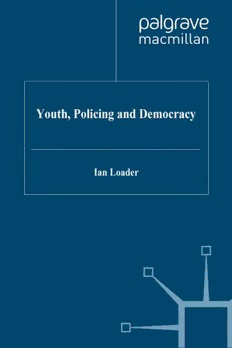
Youth, Policing and Democracy PDF
Preview Youth, Policing and Democracy
YOUTH, POLICING AND DEMOCRACY Also by Ian Loader CAUTIONARY TALES: Young People, Crime and Policing in Edinburgh {with Simon Anderson, Richard Kinsey and Connie Smith) Youth, Policing and Democracy Ian Loader Lecturer, Department of Criminology Keele University Staffordshire f& ft ©Ian Loader 1996 All rights reserved. No reproduction, copy or transmission of this publication may be made without written permission. No paragraph of this publication may be reproduced, copied or transmitted save with written permission or in accordance with the provisions of the Copyright, Designs and Patents Act 1988, or under the terms of any licence permitting limited copying issued by the Copyright Licensing Agency, 90 Tottenham Court Road, London W1P 9HE. Any person who does any unauthorised act in relation to this publication may be liable to criminal prosecution and civil claims for damages. First published 1996 by MACMILLAN PRESS LTD Houndmills, Basingstoke, Hampshire RG21 6XS and London Companies and representatives throughout the world ISBN 0-333-63660-0 hardcover ISBN 0-333-63661-9 paperback A catalogue record for this book is available from the British Library. 10 9 8 76 5 4 3 21 05 04 03 02 01 00 99 98 97 96 Printed and bound in Great Britain by Antony Rowe Ltd Chippenham, Wiltshire For Mum and Greg The power of judgement rests on a potential agreement with others, and the thinking process which is active in judging something is not, like the thought process of pure reasoning, a dialogue between me and myself, but finds itself always and primarily, even if I am quite alone in making up my mind, in an anticipated communication with others with whom I know I must finally come to some agreement. And this enlarged way of thinking, which as judgement knows how to transcend its individual limitations, cannot function in strict isola tion or solitude; it needs the presence of others 'in whose place* it must think, whose perspective it must take into consideration, and without whom it never has the opportunity to operate at all. Hannah Arendt, Between Past and Future Contents Preface ix Introduction 1 1 Policing and the Youth Question: Against Managerialism 6 2 Communicative Action, Democracy and Social Research 30 3 The Uses and Meanings of Public Space: Belonging, Identity and Safety 50 4 Policing Public Space: The Over-Control and Under-Protection of Youth 76 5 Transitions in Trouble: Fragmentation, Inclusion and Marginalisation 102 6 Talking Blues: Youth, the Police and Prospects for Communication 130 7 Towards Discursive Policing 158 Notes 111 Bibliography 184 Index 192 vii Preface The task I attempt in this book often seems a rather daunting one. Draw ing inspiration from recent social and political theory, I strive to bring together within a single account normative theorising and critique, and sociological investigation and interpretation. In particular, I try to develop an understanding of police accountability that is informed by both the recent work of Jiirgen Habermas on communicative action, and interview- based research with young people and police officers. My hope is that our theoretical appreciation of democratic communication and its pros pects will be enhanced by its encounter with a particular set of social issues - namely, policing and police-youth relations; and that our under standing of those issues can be enriched by looking at them through the lens of democracy. This book started life as a doctoral thesis (something one hesitates to mention lest one invites the stock refrain 'this reads like a PhD'). In revising it for publication I have been preoccupied with two over arching concerns. I have endeavoured, first of all, to make sense of the managerialism that has recently become such a predominant feature of the policing scene in Britain. Using Habermas's theory of communicat ive action, I have tried to develop both a principled critique of man agerialism and an alternative, more democratic way of thinking about police accountability, one I then use to inform the empirical enquiry. In so doing, I hope to have made some some small - and accessible - contribution to the important theoretical task of combining normative reflection and social research. In dealing with the research material I have tried, in so far as is pos sible, to allow young people and police officers to speak for themselves about the issues which confront them. But I have also interpreted their accounts in the light of my concern with democratic communication, something which inevitably entails pursuing certain lines of enquiry while at the same time neglecting others. I have in this respect - and this has not always been easy - taken care to keep the interpretation within cer tain bounds. Carrying out and reflecting upon this research has thrown up a host of puzzles, problems and ideas, some theoretical, others sub stantive. These, concerning such matters as place, crime and insecurity, crime and collective memory, and the social meanings of policing, I am now pursuing elsewhere. It is very tempting, however, to somehow 'write these in' to one's interpretation of the problem that first gave rise to them; IX
